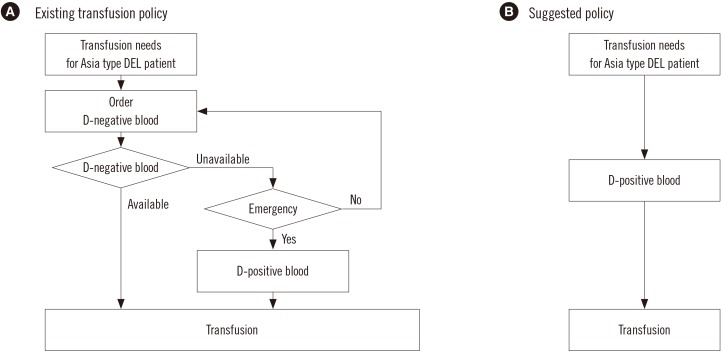Ann Lab Med.
2019 Jan;39(1):102-104. 10.3343/alm.2019.39.1.102.
Planned Transfusion of D-Positive Blood Components in an Asia Type DEL Patient: Proposed Modification of the Korean National Guidelines for Blood Transfusion
- Affiliations
-
- 1Department of Laboratory Medicine and Genetics, Samsung Medical Center, Sungkyunkwan University School of Medicine, Seoul, Korea. duck.cho@skku.edu
- 2Department of Laboratory Medicine, Chonnam National University Medical School & Hospital, Gwangju, Korea.
- 3Department of Thoracic and Cardiovascular Surgery, Samsung Medical Center, Sungkyunkwan University School of Medicine, Seoul, Korea.
- KMID: 2420280
- DOI: http://doi.org/10.3343/alm.2019.39.1.102
Abstract
- No abstract available.
MeSH Terms
Figure
Cited by 2 articles
-
A Case of Partial D Type VI-3 Confirmed by
RHD Genotyping
Jong Kwon Lee, HongBi Yu, Yoo Na Chung, Jae Chun Bae,, Duck Cho
Lab Med Online. 2020;10(4):326-329. doi: 10.47429/lmo.2020.10.4.326.Guide to Rho(D) Immune Globulin in Women With Molecularly Defined Asian-type DEL (c.1227G>A)
In Hwa Jeong, SooHo Yu, Tae Yeul Kim, Soo-Young Oh, Duck Cho
Ann Lab Med. 2024;44(4):307-313. doi: 10.3343/alm.2023.0356.
Reference
-
1. Seo MH, Won EJ, Hong YJ, Chun S, Kwon JR, Choi YS, et al. An effective diagnostic strategy for accurate detection of RhD variants including Asian DEL type in apparently RhD-negative blood donors in Korea. Vox Sang. 2016; 111:425–430. PMID: 27864976.2. Shao CP. Transfusion of RhD-positive blood in “Asia type” DEL recipients. N Engl J Med. 2010; 362:472–473. PMID: 20130261.3. Wagner FF, Frohmajer A, Flegel WA. RHD positive haplotypes in D negative Europeans. BMC Genet. 2001; 2:10. PMID: 11495631.4. Korea Centers for Disease Control and Prevention. Korean National Transfusion Guideline. 4th ed. Osong: Korea Centers for Disease Control and Prevention;2016. p. 15–16.5. Park JY, Cho D, Choi HW, Jeon MJ, Park MS, Song JW, et al. A patient with RhDel (1227G>A) failed to produce detectable anti-D after transfusion of RhD positive red blood cells. Korean J Blood Transfus. 2006; 17:153–158.6. Kormoczi GF, Gassner C, Shao CP, Uchikawa M, Legler TJ. A comprehensive analysis of DEL types: partial DEL individuals are prone to anti-D alloimmunization. Transfusion. 2005; 45:1561–1567. PMID: 16181205.7. Xu W, Zhu M, Wang BL, Su H, Wang M. Prospective evaluation of a transfusion policy of rhd-positive red blood cells into DEL patients in China. Transfus Med Hemother. 2015; 42:15–21. PMID: 25960711.8. Gardener GJ, Legler TJ, Hyett JA, Liew YW, Flower RL, Hyland CA. Anti-D in pregnant women with the RHD(IVS3+1G>A)-associated DEL phenotype. Transfusion. 2012; 52:2016–2019. PMID: 22313164.9. Richard M, Perreault J, Constanzo-Yanez J, Khalife S, St-Louis M. A new DEL variant caused by exon 8 deletion. Transfusion. 2007; 47:852–857. PMID: 17465950.
- Full Text Links
- Actions
-
Cited
- CITED
-
- Close
- Share
- Similar articles
-
- Transfusion of RhD-Positive Blood Components to Serologic RhD-Negative Patients-Review of Current Literature: An Opinion
- Managerial Strategy for the Transportation and Transfusion Period for the Blood Components at Hospitals: An Opinion
- Transfusion of RhD-Positive Blood Products to Asia Type DEL Patients: A Report of Two Cases
- Guidelines for Appropriate and Safe Transfusion
- Experience in Establishing Department of Transfusion Management


